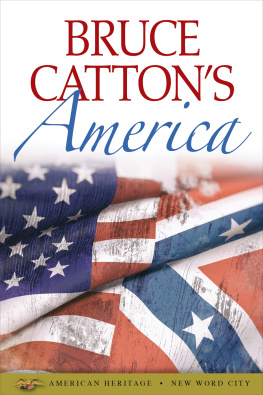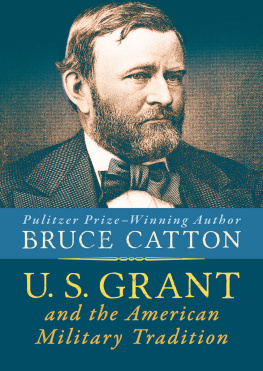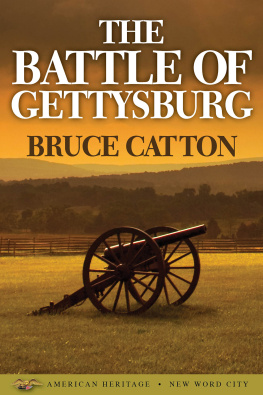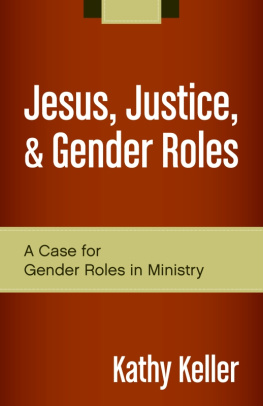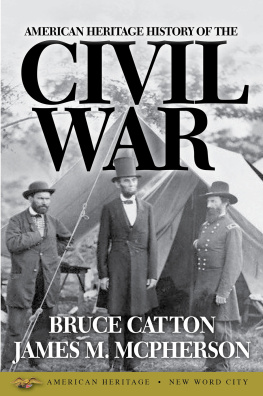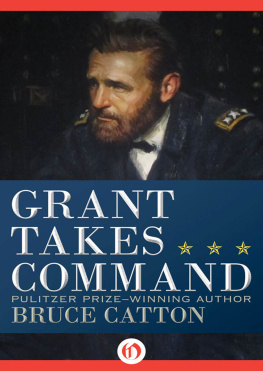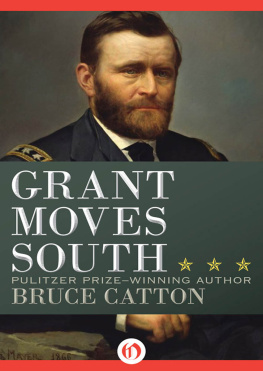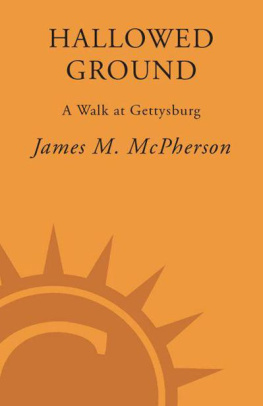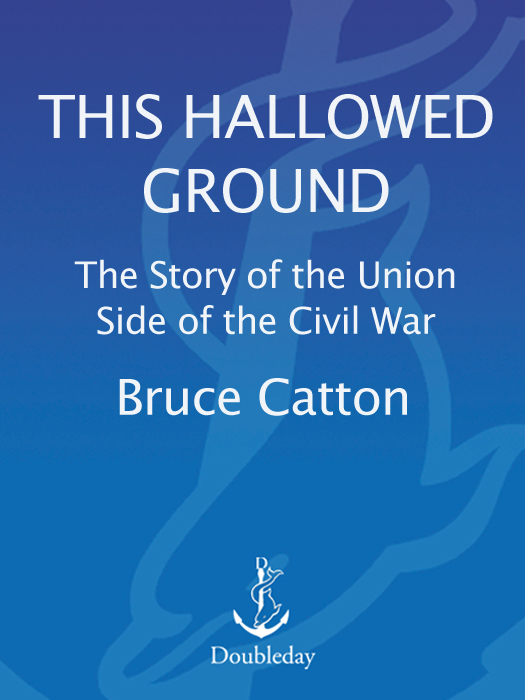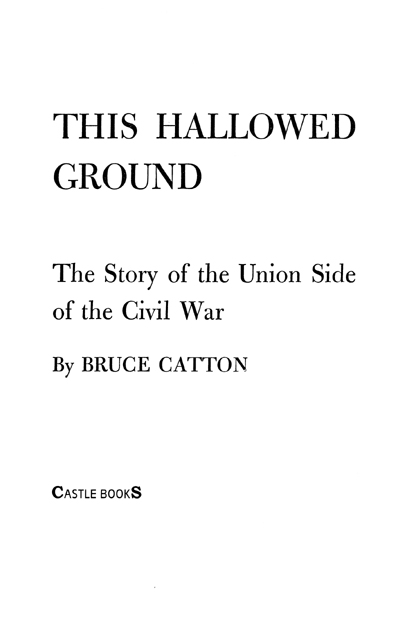BOOKS BY BRUCE CATTON
This Hallowed Ground
Banners at Shenandoah (juvenile)
U. S. Grant and the Military Tradition
A Stillness at Appomattox
Glory Road
Mr. Lincolns Army
The War Lords of Washington
CASTLE BOOKS
A division of Book Sales, Inc.
114 Northfield Avenue
Edison, New Jersey 08837
Published by arrangement with and permission of
DOUBLEDAY, a division of The Doubleday Broadway Publishing Group, a division of Random House, Inc., 1540 Broadway, New York, New York 10036
Copyright 1955, 1956, by Bruce Catton
All rights reserved. This publication may not be reproduced, stored in a retrieval system, or transmitted in any form or by any means, electronic, mechanical, photocopying, recording or otherwise, without the prior permission of the publishers.
eISBN: 978-0-307-94748-2
v3.1
To Nellie Catton
Contents
LIST OF MAPS
Chapter One
THE HURRICANE COMES LATER
1. Sowing the Wind
T HE senator was tall and handsome, with wavy hair to frame a proud ravaged face, and if hearty feeding had given him the beginning of a notable paunch he was erect enough to carry it well. He had the easy grace of a practiced orator his speeches, according to spiteful enemies, were carefully rehearsed night after night before a mirror in his chambers, while an awed colored boy stood by with a lighted candle and there was a great humorless arrogance about him, for he had never been blessed with a moment of self-doubt. He liked to say that he was in morals, not in politics. From this the logical deduction was that people who opposed him, numerous though they undoubtedly were, must be willfully wrong.
Such a deduction Senator Charles Sumner was quite capable of drawing for himself. He would draw it today in the Senate chamber. In his speech, he had told a friend, he would pronounce the most thorough philippic ever uttered in a legislative chamber.
It was an ominous promise. The date was May 19, 1856, and although there was still a little time left it was running out fast, and angry words might make it run faster. Yet angry words were about the only kind anyone cared to use these days. Men seemed tired of the reasoning process. Instead of trying to convert ones opponents it was simpler just to denounce them, no matter what unmeasured denunciation might lead to.
The point at issue was, at bottom, simple enough: how to legislate so that Kansas might someday become a state. But Kansas was a symbol rather than a territory. Men saw what they feared and hated, concentrated on its wide empty plains, and as they stared they were losing the ability to see virtue in compromise and conciliation. The man on the other side, whatever ones vantage point, was beginning to look ominously alien. He could not easily be dealt with, and perhaps it was best simply to lash out at him. In the charged atmosphere thus created the lightest act could be fateful. All of the things that were slipping beyond hope of easy solution sectional enmities, economic antagonisms, varying interpretations of the American dream, the tragic unendurable race problem itself all of these, somehow, might hinge on what was done about Kansas, so that the wrong phrase in an enacting clause could mean earths best hope lost forever.
In Senator Sumners view the wrong phrase was on the verge of adoption. The bill which the Senate was about to pass would, as he saw it, mean that Kansas must eventually become a slave state. In addition, it would give a great deal of aid and comfort to slaverys advocates, wherever they were. It was not to be thought of calmly; it was not merely wrong, it was an actual crime. Furthermore, it was no common crime; it was (he solemnly assured the Senate) a fearful thing, the crime against nature, from which the soul recoils, and which language refuses to describe. Yet if language could not describe it the senator could, and he would do so.
He was a man of breeding and education, given to much study of the classics; and he stood now in the Senate chamber, looking imperiously about him as one who has glimpsed the tables of the law on the mountaintop, and he dwelt extensively on the rape of a virgin territory, compelling it to the hateful embrace of slavery. The South, he said, was guilty of a depraved longing for a new slave state, the hideous offspring of such a crime. Force had been used, he declared, in compelling Kansas to this pollution.
The desk in front of Senator Sumner was empty. It belonged to Senator Andrew Butler of South Carolina, and when Sumner first became a senator, white-haired Butler had been pleasant and cordial so much so that Sumner wrote to a friend that he had learned, from the old gentlemans kindness, to shun harsh and personal criticism of those from whom I differ. But that had been years ago, when men from Massachusetts and South Carolina could still exchange courtesies in the Senate chamber; and in any case Sumner was always ready to denounce even a close friend, and in the most unmeasured terms, if he suspected that the friend had fallen into error. Butler was a spokesman for slavery, he had had his part in the crime against nature, and the fascinating exercise of discussing political opposition in terms of sexual depravity could be carried on by this bookish man, still unmarried at forty-five with Butler as the target. Sumner addressed himself to the absent Butler.
The South Carolina senator considered himself a chivalrous knight, but Sumner had seen the truth: He has chosen a mistress to whom he has made his vows, and who, though ugly to others, is always lovely to him; though polluted in the sight of the world, is chaste in his sight I mean the harlot slavery. For her his tongue is always profuse with words. Let her be impeached in character, or any proposition made to shut her out from the extension of her wantonness, and no extravagance of manner or hardihood of assertion is then too great for this senator.
There was quite a bit more of this, ranging all the way from Senator Butler to the ancient Egyptians, who worshipped divinities in brutish forms, with due mention of the obscene idols to which the Aztecs had made human sacrifices; the connection of these latter with the harlot slavery not being of the clearest. At one stage Sumner interrupted himself to cry: Mr. President, I mean to keep absolutely within the limits of parliamentary propriety; and then he went on, his speech still unfinished at the sessions end.
The senator managed to reach his conclusion the following day, reminding the presiding officer (perhaps unnecessarily) that an immense space has been traversed, and in closing he came back from brutish idols and obscene Aztecs to Senator Butler, from whom he had learned not to let political arguments get personal. There was not, he said, any possible deviation from the truth of which Butler was innocent, although fortunately these deviations were made in the heat of such passion as to save him from the suspicion of intentional aberration. Still, there it was: The senator touches nothing which he does not disfigure with error, sometimes of principle, sometimes of fact.
A philippic, as he had promised. No single vote had been changed by it; the Senate would decide, at last, precisely as it would have done if he had kept quiet. But he had not been trying to persuade. No one was, these days; a political leader addressed his own following, not the opposition. Sumner had been trying to inflame, to arouse, to confirm the hatreds and angers that already existed. In the North there were men who from his words would draw a new enmity toward the South; in the South there were men who would see in this speaker and what he had said a final embodiment of the compelling reasons why it was good to think seriously about secession.


